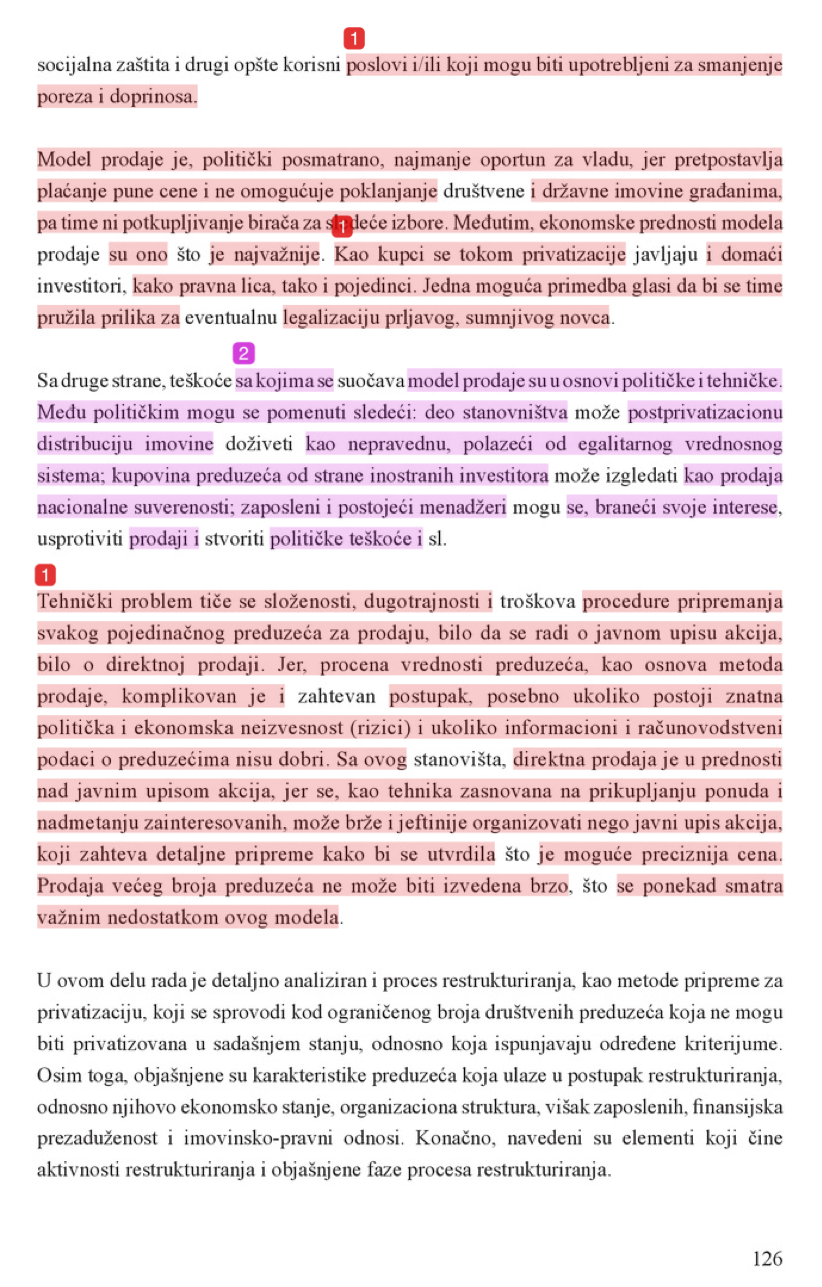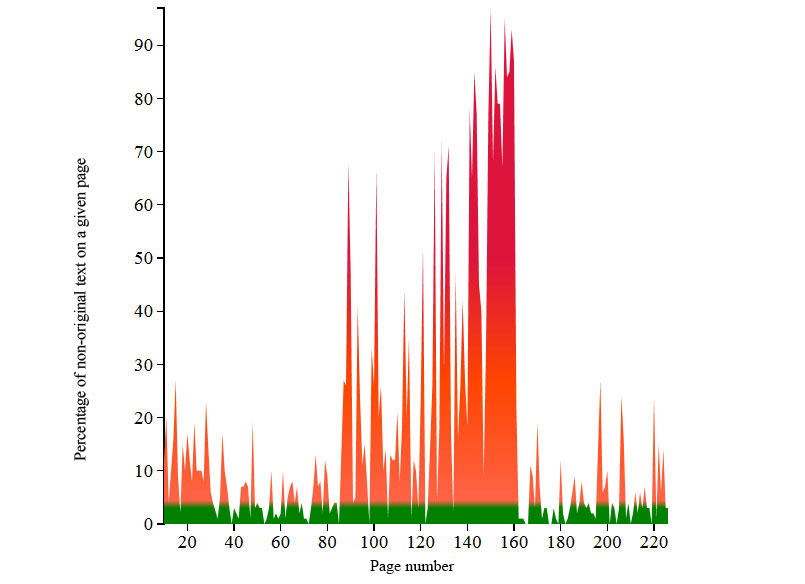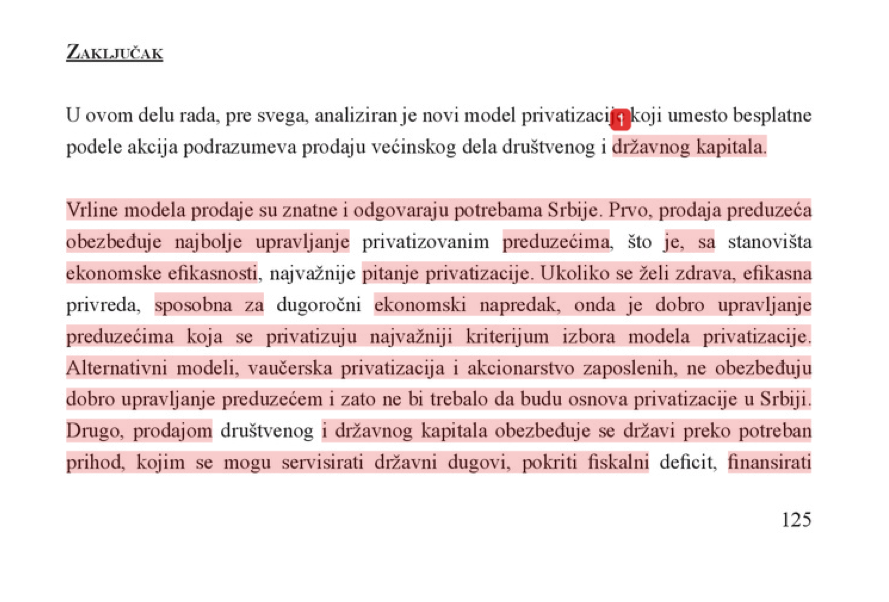Mr. Sinisa Mali, 42, the current mayor of Belgrade, former assistant to the Minister of Privatization in the DOS government, and the Director of the Centre for Tender-Auction Privatization, Restructuring and Capital Market of the Privatization Agency, defended his doctoral thesis “Creating Value Through the Process of Restructuring and Privatization – Theoretical Concepts and Experiences of Serbia” in 2013 at the University of Belgrade’s Faculty of Organizational Sciences, and gained the title of PhD. This title is undeserved. Mr. Sinisa Mali’s doctoral dissertation is one of the worst cases of plagiarism that the Serbian public will have ever seen.
I have been reading student papers for about ten years. It’s my job. In my career, I have never encountered as much copying as I did in Mr. Mali’s doctoral thesis. The amount of non-original text is best illustrated by the graph below, where you can see the percentage of non-original text per page of the doctoral thesis. By clicking on any point in the graph, you can get a report from the program iThenticate (for plagiarism detection), namely one report for each individual page of the doctoral thesis, where Mr. Mali’s non-original text and the actual source of this text, where identical, are highlighted. A certain percentage of almost every page of the doctoral thesis is comprised of non-original text, while on more than one third of pages, Mr. Mali has plagiarized 33 percent of the text or more! With that much plagiarism, the doctoral thesis can hardly be called the property of Sinisa Mali, since he didn’t write most of it. Mr. Sinisa Mali is a major plagiarist.
Take for example page 125, where Mali states “his” fourth chapter conclusion:
An identical passage is found on page 26 of a paper written by Boris Begovic, Bosko Zivkovic and Bosko Mijatovic, titled “New Model of Privatization in Serbia”, which was published by the Center of Liberal-Democratic Studies:
Citat 1 (p 125 of diss)
In this part of the study a new model of privatization was analysed, which rather than the free distribution of shares involves the sale of the majority stake of social and state capital. The advantages of the sale model are significant and they are in line with the interests of Serbia. First, the sale of the business secures better management for privatized firms. This is, from the point of view of economic efficiency, the most important issue in privatization. If a healthy, efficient economy, capable of long-term economic advancement, is desired, then good management of businesses that are privatized is the most important criterion for choosing a model of privatization. The alternative models, voucher privatization or distribution of shares to employees, do not guarantee good management of the firm and should therefore not be the basis for privatization in Serbia. Second, the sale of social and state capital secures needed income for the state, which can be used to regulate public debt, cover budget deficits, finance.
Further, the “conclusion of Sinisa Mali” on page 126 states:

Paragraphs highlighted in red are, like previous ones from page 125, copied word-for-word from the paper by Professor Begovic, Zivkovic, and Mijatovic. The paragraph highlighted in purple is copied from “the free encyclopaedia” – Wikipedia, specifically from the page dedicated to privatization. The original Wikipedia entry is as follows:
Citat 3 (from Wikipedia)
The problems confronted by the sales model are political and technical in nature. Among the political problems, the following can be mentioned: a portion of the population experiences the post-privatisation distribution of property as unjust, on the basis of an egalitarian system of values; the purchase of businesses by international investors appears to some as the sale of national sovereignty; employees and current managers sometimes, in defence of their interests, oppose the sale and create political difficulties, and so on.
Of course, these are not the only examples of plagiarism found in the dissertation. There are myriad examples in Mr. Mali’s doctoral thesis. Anyone who can read can check and verify the astounding amount of copying contained in this “doctoral thesis” by using the interactive graph that accompanies this article, together with the relevant plagiarism reports generated by the program iThenticate.
Unfortunately, the story does not end here. Mr. Mali used an entire arsenal of plagiarism methods in his doctoral thesis. So in addition to stealing text from various sources written in Serbian, Mr. Sinisa Mali also stole text from sources written in English. This sort of plagiarism cannot be seen with iThenticate reports in the graph above. Emulating Dr. Aleksandar Sapic, Mr. Mali literally just translated a huge part of his dissertation from English, specifically a doctoral thesis whose topic was privatization in Eritrea: Stifanos Hailemariam, Corporate Value Creation, Governance and Privatisation: Restructuring and Managing Enterprises in Transition – The Case of Eritrea (doctoral thesis defended at the University of Groningen, The Netherlands, 2001). The thesis written by Dr. Hailemariam (who is now a professor at the University of Asmara, the capital of Eritrea), is available online in its entirety.
Mr. Mali plagiarized most of his second chapter about theoretical concepts and experiences of the privatization process from the aforementioned thesis, and also stole Dr. Hailemariam’s references and literature review — omitting only the analyses specific to Eritrea.
Since here we have a translation from English to Serbian, this sort of plagiarism cannot be seen in iThenticate reports, making it much more difficult to discover. Literal translations of almost the entire second chapter of Sinisa Mali’s doctoral thesis shown here were found manually. It’s reasonable to suspect that there are more translations like this from other sources in the thesis, so it remains unclear if it contains any original text at all.
In short, Mr. Mali is nothing if not eclectic in his plagiarism – he lifted from other doctoral theses and scientific papers, and did not refrain from using Wikipedia nor about 20 pages literally copied from the website of the Privatization Agency. Mali did not just pinch a little bit, but plagiarized entire chapters. In addition to the mayor, accountability also lies with the members of the committee, who allowed a doctoral thesis like this one to be defended.
About 10 days ago, Mr. Mali and the Minister of Education, Science and Technological Development, Srdjan Verbic, presented awards to the best students of the current class of Belgrade’s primary and secondary schools. During the ceremony, Mr. Mali remarked that it is not easy to be the best student in a generation, because it requires so much effort and sacrifice. He called the award-winning students the pride of their parents, their teachers and Belgrade. “You are the future of the city of Belgrade and it is up to us and the Republic of Serbia to ensure the right conditions exist for you to carry on in your life and career as you have up to this point, and to stay in this city and make it an even better place to live,” Mali said.
Mayor Mali, you can now directly ensure that the right conditions for the lives and careers of young and successful scientists exist, by showing with your example that effort and sacrifice are valued, rather than fraud and plagiarism. If the model for privatization in Serbia was Eritrea, a country that the International Monetary Fund ranks 183rd in the world for Gross Domestic Product per capita (some 707 dollars per year), I hope that by taking responsibility for your plagiarism you will prevent Serbian higher education from becoming as impoverished as the economy of Eritrea.
So:
– I call on Sinisa Mali to resign from the position of Mayor of Belgrade, member of the Board of the Clinical Center of Serbia, and President of the Board of Komercijalna Banka, and cease performing all other public functions for which he is currently responsible.
– I call on the University of Belgrade to revoke Sinisa Mali’s doctoral title.
– If Mr. Mali refuses to resign from his public functions, I call on the Government of Serbia, the Parliament of the City of Belgrade, and other relevant authorities to dismiss him.
– I call on the authors and the organizations whose intellectual property Sinisa Mali has so abused to initiate civil and criminal lawsuits against him for infringement of copyright.
I wish to end this text by paraphrasing a letter that a group of German scientists sent to Chancellor Angela Merkel when a group of bloggers discovered that Germany’s Minister of Defence of Guttenberg plagiarized his thesis in a manner very similar to Mr. Mali: “If the protection of ideas is no longer important in our society, then we will gamble our future away. The credibility of the scientific community is suffering great damage due to the government’s treatment of the plagiarism of Interior Minister Stefanovic (though hopefully not Sinisa Mali as well) as some kind of insignificant offense. The credibility of Serbia as a whole is suffering, too.”
Balkanist, 09.07.2014.
Peščanik.net, 12.07.2014.





